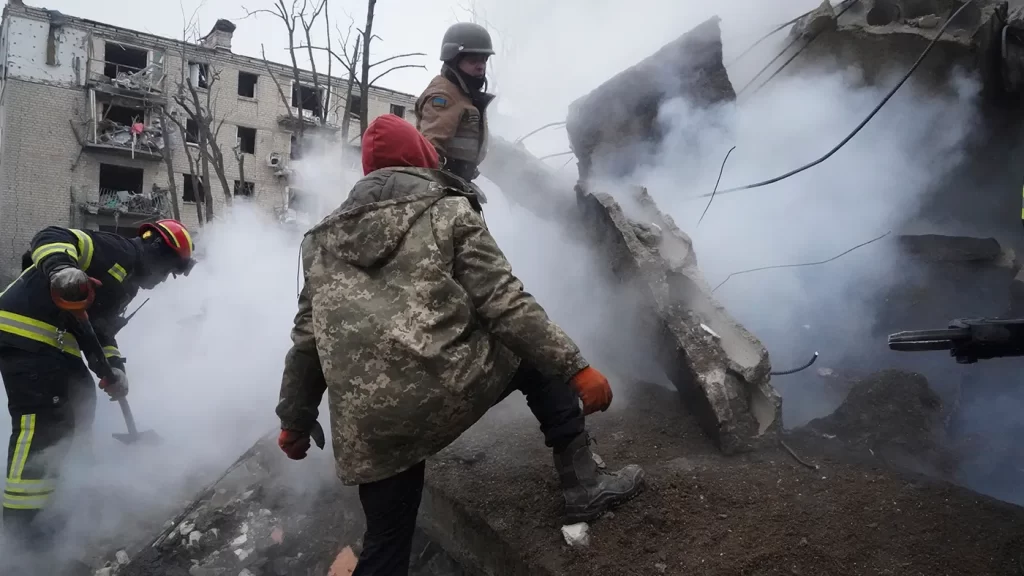World Geostrategic Insights interview with George Beebe on whether a compromise with Russia might be necessary to end the war in Ukraine.

George Beebe is Director of Grand Strategy at the Quincy Institute for Responsible Statecraft. He is one of America’s most well-informed and insightful experts on international affairs and foreign policy, with an especially strong background in cyber security, US intelligence, US-Russia relations. George Beebe spent more than two decades in government as an intelligence analyst, diplomat, and policy advisor, including as director of the CIA’s Russia analysis, director of the CIA’s Open Source Center, and as a staff advisor on Russia matters to Vice President Cheney. He has also served as President of the technology company Behavior Matrix LLC. He is the author of the book “The Russia Trap: How Our Shadow War with Russia Could Spiral into Nuclear Catastrophe”.
Q1 – For nearly two years at the center of world attention, the war in Ukraine looks set to continue through 2024. Russia is making military advances in some areas recaptured by Kiev in the summer counteroffensive and is launching the largest airstrikes on Ukrainian targets since the invasion began. Ukraine’s military prospects look dim, in part because Western military aid seems no longer guaranteed at the levels of past years. In his New Year’s address, Russian President Vladimir Putin promised that his country “will never back down”….., “We have proven time and again that we can solve the most difficult tasks and that we will never back down because no force can divide us,” he said, peace with Ukraine will come only “when we have achieved our goals.” In turn, the Ukrainian president said that only total liberation from Russian occupation and a return to internationally recognized borders will end the conflict. How could this war end? Strong military and politico-economic support from the European Union, the United States, and NATO to Ukraine has undoubtedly weakened Russia’s capabilities, but it does not appear to be enough to win the war for Ukraine.
Might different policies be necessary? Does a diplomatic compromise agreement with Russia still remain an option to be ruled out? Would a compromise with Russia really encourage Moscow to seize other territories in Europe and even other parts of the world, as President Zelenskiy has warned?
A1 – At present, neither side appears capable of unconditional victory on the battlefield. Russia’s initial bid to sweep into Kyiv in early 2022 and install a pro-Russian government failed spectacularly, and conquering and governing the bulk of Ukraine would require an army many times the size of Russia’s present force. Similarly, Ukraine’s bid last summer to pierce Russian lines and recapture occupied territory failed and incurred enormous losses of men and weaponry.
As a result, this war has become an endurance contest, one that will be determined not by which army can outmaneuver the other on the battlefield, but by which state proves more capable of sustaining its ability to send soldiers and weapons into battle. In such a contest, I believe Russia has formidable advantages that are likely to increase over time. Russia is greatly outpacing both the United States and Europe in the manufacture of artillery shells, missiles, tanks, and other armaments. Sustaining Western supplies to Ukraine is not just a matter of political will; at present, we lack the manufacturing capacity to provide what Ukraine needs quickly enough.
Moreover, Russia’s population has grown since the start of the invasion, as immigrants from Central Asia seeking employment and refugees from Ukraine seeking safety have outnumbered those fleeing Russia in opposition to the war. By contrast, Ukraine’s numbers have plummeted from an already low level, with many millions fleeing Ukraine. As a result, Ukraine probably now has less than a quarter of Russia’s population. Many of those who have fled Ukraine were children, women of child-bearing age, or well-educated – the foundations, in other words, of Ukraine’s future prosperity. That fact alone has grave implications for Ukraine’s ability over time to fill out an army and man the factories needed to support one.
The question for Ukrainian and Western policymakers to consider is this: Is Ukraine’s position likely to be better in six months or a year? If so, it would make sense to play for time, opting for a defensive strategy that enables Ukraine to hold off Russian advances for years to come, even if it cannot recapture lost ground. But if not — if Ukraine is likely to be in a weaker position — then it would be wise to seek a compromise end to the war sooner rather than later.
Is such compromise possible? The positions of Ukraine and Russia are indeed diametrically opposed today. Russia insists that Ukraine agree to a legally binding neutrality; Ukraine has enshrined the goal of NATO membership in its constitution. Ukraine demands the return of all Russian-occupied territory; Russia has formally annexed four Ukrainian provinces, as well as Crimea. Russia demands demilitarization and “deNazification” of Ukraine; Ukraine insists on its sovereign right to self-defense and self-determination. Moreover, there is no trust between Russia and Ukraine or between Russia and the West. These are all formidable obstacles to a settlement.
But Ukraine and the West would still retain some leverage in a broader negotiation, should they seek one. Russia is able to wreck Ukraine and thereby ensure it is in no condition to join NATO or rebuild its economy, meaning it can achieve many of its war objectives unilaterally. But Russia cannot govern Ukraine, nor can it fight its way into gaining an accepted role in European security organizations and reducing its dependence on China that its invasion has deepened. Absent a settlement, Russia will face the prospect of a volatile line of confrontation with the West for decades to come, with few or none of the mechanisms that helped to keep the Cold War cold. These are incentives for Moscow to consider a settlement, although they are not imperatives.
Given Russia’s advantages in the war, to reach a settlement the West will have to accept Ukraine’s neutrality and agree to some limits on its military holdings and activities. But in return, Russia will have to agree to limits on its own military deployments opposite Ukraine and accept that the Ukrainian people will be free to determine their own political system and steer their own economic course, just as Finland and Austria did during the Cold War.
Q2 – At a press conference alongside Volodymyr Zelenskiy in Kiev, British Prime Minister Rishi Sunak warned that Putin will not stop in the event of victory in Ukraine and that victory would strengthen Russian allies in North Korea, Iran and elsewhere. What is your opinion? Could the geopolitical ambitions, and capabilities, of countries like Iran and North Korea really be affected by the results of the war in Ukraine?
A2 – The chances that Russia might parlay some kind of victory in Ukraine into new invasions in Europe are quite low. In Ukraine, Russia has had a formidable challenge conquering territory on its immediate border, on terrain it knows well, with the benefit of short supply lines and years of intelligence preparation. Generating Russian public enthusiasm for the war was difficult, and there is a clear popular desire among Russians to return to normal once the war is over. It is difficult to imagine that Russia could successfully invade a NATO state, for which NATO would very likely have advanced intelligence warning and would almost certainly invoke an Article V defense. It would also involve much longer supply lines and much less favorable conditions. Nor are there any signs that Russians desire such a war. In fact, Russia has gone to great lengths to avoid direct clashes with NATO in its invasion of Ukraine.
It is true that the confrontation between Russia and the West over Ukraine and over the broader architecture of European security has driven Russia closer to China, Iran, and North Korea, much to the West’s disadvantage. These closer relations have almost certainly emboldened Iran and North Korea, whose room for international maneuver had been constrained for several decades by Russia’s erstwhile cooperation with the West in reining in their arms programs. And the cooperation between Russia and these two states has created new bonds between their respective military organizations and defense industries, which will strengthen while the war in Ukraine continues. This is an argument for settling the war in Ukraine, however, not continuing it. Dividing one’s adversaries is a time-honored tactic; ham-handedly uniting them is geostrategic malpractice.
Q3 – Russian Foreign Minister Sergei Lavrov has stated on several occasions that Russia considers a nuclear war unacceptable. However, on Jan. 11, former Russian President Dmitry Medvedev, now vice-chairman of the Russian Security Council, explicitly warned of a Russian nuclear response if Ukraine hits missile launch sites inside Russia with long-range missiles supplied by the West. He also added that the Russian-Ukrainian conflict always has the risk of turning into a full-blown nuclear war and that this would be a disastrous scenario for everyone. In your book “The Russia Trap – How Our Shadow War with Russia Could Spiral into Nuclear Catastrophe” first published in September 2019, you analyzed how Washington and Moscow could be headed for nuclear annihilation. In your book, you also point out how Americans (and we can add almost all people in the world) do not worry about nuclear war as they did 30 years ago, instead they should because now the danger has become even greater. Your predictions seem very appropriate in the context of the current confrontation between Russia and the West.
Are we potentially facing a disastrous nuclear conflict in the midst of general indifference? What could be done to de-escalate this situation?
A3 – There is in general too much complacency about the likelihood of escalation into a nuclear exchange. Clearly, neither side wants such escalation. That does not mean, however, that we could not stumble into a nuclear confrontation inadvertently. This could happen in many ways, including by either side forcing the other to choose between humiliation and nuclear use – exactly the scenario John Kennedy warned against after the Cuban missile crisis.
We also need to be wary of putting Russia in a perceived “use or lose” decision. It is important to understand that the Russians believe the United States is attempting to defeat Russia through use of its proxies in Ukraine and NATO, and that the stakes for Russia are existential. Viewing developments through such a prism, Russia is prone to worst-case interpretations of events. It could overreact to Ukrainian attacks on Russia airfields, air defense systems, and missile launch facilities, fearing that an incoming wave of missiles could threaten its nuclear arsenal or facilitate a surprise American nuclear strike. The best way to minimize these dangers is to push toward a compromise end to the war in Ukraine and restore talks on nuclear arms control and broader security in Europe.
George Beebe – Director of Grand Strategy at the Quincy Institute for Responsible Statecraft.
Image Credit: AP







